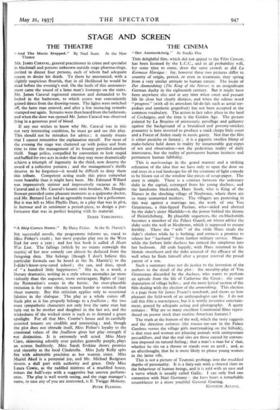"Der AmmenkOnig." At Studio One
THE CINEMA
This delightful film, which did not appeal to the Film Censor, has been licensed by the L.C.C., and in all probability will, for some time to come, draw the same crowds as did La Kermesse Heroique : for, however these two pictures differ in country of origin, period, or even in treatment, they spring from a very similar attitude to human nature. The locale of Der Ammenkonig (The King of the Nurses) is an insignificant German duchy in the eighteenth century. But it might have been anywhere else and at any time when court and peasant life lie close but clearly distinct, and when the odious word "progress" (with all its attendant fal-de-lals such as aerial tor- pedoes and synthetic grapefruit) has not been accepted in the common vocabulary. The action in fact takes place in the land of Cockaigne, and the time is the Golden Age. The picture painted by La Bruyere of aristocratic persiflage and gallantry against the background of a brutalised and poverty-stricken peasantry is here inverted to produce a staid, sleepy little court and a Forest of Arden study in rustic gaiety. Not that the film is either pastiche or fantasy ; it is a gigantic swollen blimp of make-believe held down to reality by innumerable guy-ropes of wit and observation—not the pedestrian reality of daily intercourse, but the reality of permanent human instincts and permanent human fallibility.
This is marivaudage in the grand manner and a striking refutation of the idea that we have only to open the door on real trees in a real landscape for all the creations of light comedy to be blown out of the window like pieces of scrap-paper. The story is simple. There is a contrast between the sedentary duke in the capital, estranged from his young duchess, and the handsome blacksmith, Hans Stork, who is King of the Nurses in the shocking village of Neubronn, where there are so many unmarried mothers. The villagers are protesting in this way against a marriage tax, the work of one Von Grunienaii, a thin-lipped Puritan, who—aided and abetted by. the duke's sister Mathilde—is the power behind the throne of Heinrichsburg. By plausible sequences, the ex-blacksmith becomes a member of the Palace Guard, on whose advice the duke seeks the well at Neubronn, which is supposed to ensure fertility. There the " wife " of the virile Hans steals the duke's clothes while he is bathing, and extracts a promise to release her " husband " from further military service. Mean- while the forlorn little duchess has enticed the simpleton into her bedroom. All ends happily, with Hans returned to his blonde sweetheart and the duke assured of the efficacy of the well when he finds himself after a proper interval the proud parent of a son.
Such a summary does not do justice to the invention of the authors in the detail of the plot : the morality-play of Von Grunzenau discarded by the duchess, who wants to perform an episode from the life of Catherine the Great ; the court deputation of village belles ; and the more lyrical section of the film dealing with the election of the ammenkOnig. This election is a page from Sir James Frazer's notebook, and shows us how pleasant the field-work of an anthropologist can be. I do not call this film a masterpiece, but it is wittily inventive entertain- ment, graced. by adequate acting and photography. A query remains : Why are so many excellent Continental films repro- duced on poorer stock than routine American features
The truth at the bottom of the well, which the story suggests and the direction enforces (the rococo see-saw in the Palace Gardens versus the village girls merrymaking on the hillside), is that men and women are pleasing animals with unimportant peccadilloes, and that the real sins are those caused by conven- tion imposed on natural feeling; that a man's a man for a' that, whether he sits on a throne or stands over an anvil ; and, as an afterthought, that he is more likely to please young women in the latter role.
This is not a picture of Teutonic probings into the muddied depths of personality. It is a fairy-tale with a shrewd slant on the behaviour of human beings, and it is told with an ease and a verve which is usually called Gallic. I can only find one connexion with Nazi Germany : the hero bears a remarkable resemblance to a more youthful General Goering.
KENNETH ALLOTT.














































 Previous page
Previous page